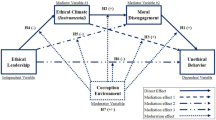Abstract
This study proposes a conceptual model to explain persistent, accepted-as-normal corporate wrongdoing (hereafter banality of wrongdoing), particularly for high performance organizations. The model describes five explanatory variables: the culture of competition, ends-biased leadership, missionary zeal, legitimizing myth, and the corporate cocoon. Our thesis is that the nature of competition drives both legitimate and illegitimate goal-seeking to adopt an iconoclastic (rule-breaking) orientation. High performance organizations are favorable hosts for wrongdoing because high performance requires aggressive behavior at the ethical margins of what is acceptable. The way leadership reacts to competition sets the stage for ethical or unethical cultures to develop. Ends-biased leadership will project strong vision, using ideology and legitimizing myth as tools to inspire and motivate. The resulting missionary zeal justifies using questionable means because of the perceived value of the end. One critical method for building strong culture is creating a sense of being separate and apart from the ordinary. This cocoon effect may create a self-referential value system that is significantly at odds with mainstream culture and in which wrongdoing is banal. We intend an empirical study of the variables described in this model.
Similar content being viewed by others
References
Alvesson, M.: 1990, ‹Organization: From Substance to Image’, Organization Studies 11(3), 373–394.
Anand, V., B. E. Ashforth and M. Joshi: 2005, ‹Business as Usual: The Acceptance and Perpetuation of Corruption in Organizations’, Academy of Management Executive 19(4), 9–23.
Armstrong, R. W.: 2006, ‹Is Greed the Critical Organizational Variable in American Corporations?’, Journal of Business, Industry and Economics 7, 21–38.
Armstrong, R. W., R. J. Williams and J. D. Barrett: 2004, ‹The Impact of Banality, Risky Shift and Escalating Commitment on Ethical Decision Making’, Journal of Business Ethics 53, 365–370.
Ashforth, B. E. and V. Anand: 2003, ‹The Normalization of Corruption in Organizations’, Research in Organizational Behavior 25, 1–52.
Bartlett, C. A. and M. Glinska: 2001, Enron’s Transformation: From Gas Pipeline to New Economy Powerhouse (Harvard Business School Press, Boston).
Baucus, M. S.: 1994, ‹Pressure, Opportunity, and Predisposition: A Multivariate Model of Organization Illegality’, Journal of Management 20(4), 699–721.
Clinard, M. B.: 1990, Corporate Corruption (Praeger, New York).
Clinard, M. B. and P. C. Yeager: 1980, Corporate Crime (Macmillan, New York).
Coleman, J. W.: 1987, ‹Toward an Integrated Theory of White-Collar Crime’, American Journal of Sociology 93(2), 406–439.
Coleman, J. W.: 1994, The Criminal Elite: The Sociology of White-Collar Crime (St. Martin’s Press, New York).
Conger, J. A.: 1990, ‹The Dark Side of Leadership’, Organizational Dynamics 19(2), 44–55.
Daboub, A. J., A. M. A. Rasheed, R. L. Priem and D. A. Gray: 1995, ‹Top Management Team Characteristics and Corporate Illegal Activity’, Academy of Management Review 20(1), 138–170.
Dutton, J. E., J. M. Dukerich and C. V. Harquail: 1994, ‹Organizational Images and Member Identification’, Administrative Science Quarterly 39(2), 239–263.
Forelle, C. and D. Clark: 2009, May 14, ‹Intel Fine Jolts Tech Sector – EU Levies Record $1.45 Billion in Monopoly Case; Win for Rival Chip Maker AMD’, Wall Street Journal (Eastern Edition), p. A.1. Retrieved May 16, 2009, from ABI/INFORM Global database (Document ID: 1710938291).
Fritzsche, D. J. and H. Becker: 1984, ‹Linking Management Behavior to Ethical Philosophy – an Empirical Investigation’, Academy of Management Journal 27(1), 166–175.
Gardner, H.: 1995, Leading Minds: An Anatomy of Leadership (Basic Books, New York).
Geertz, C.: 1973, The Interpretation of Cultures (Basic Books, New York).
Greil, A. L. and D. R. Rudy: 1984, ‹Social Cocoons: Encapsulation and Identity Transformation Organizations’, Sociological Inquiry 54, 260–278.
Gross, E.: 1978, ‹Organizational Crime: A Theoretical Perspective’, in N. Denzin (ed.), Studies in Symbolic Interaction, Volume I (JAI Press, Greenwich, Connecticut).
Gross, E.: 1980, ‹Organizational Structure and Organizational Crime’, in G. Geis and E. Stotland (eds.), White-Collar Crime: Theory and Research (Sage Publications, London), pp. 52–75.
Hamilton, E.: 1942, Mythology (Little Brown, Boston).
Hegarty, W. H. and H. P. Sim, Jr.: 1978, ‹Some Determinants of Unethical Decision Behavior: An Experiment’, Journal of Applied Psychology 63(4), 451–457.
Interview: Jeff Skilling: 2001, March 28, PBS FRONTLINE. http://www.pbs.org/wgbh/pages/frontline/shows/blackout/interviews/skilling.html. Accessed 5/16/2009.
Misangyi, V. F., G. R. Weaver and H. Elms: 2008, ‹Ending Corruption: The Interplay Among Institutional Logics, Resources, and Institutional Entrepreneurs’, Academy of Management Review 33(3), 685–709.
Noelle-Neumann, E.: 1984, The Spiral of Silence: Public Opinion – Our Social Skin (University of Chicago Press, Chicago).
Pacanowsky, M. and N. O’Donnell-Trujillo: 1983, ‹Organizational Communication as Cultural Performance’, Communication Monographs 50, 127–147.
Palmer, D. and M. W. Maher: 2006, ‹Developing the Process Model of Collective Corruption’, Journal of Management Inquiry 15(4), 363–370.
Reidenbach, R. E. and D. P. Robin: 1991, ‹A Conceptual Model of Corporate Moral Development’, Journal of Business Ethics 10(4), 273–284.
Reidenbach, R. E., D. P. Robin and L. Dawson: 1991, ‹An Application and Extension of a Multidimensional Ethics Scale to Selected Marketing Practices and Marketing Groups’, Journal of the Academy of Marketing Science 19(2), 83–92.
Rosoff, S. M., H. N. Pontel and R. Tillman: 1998, Profit Without Honor: White-Collar Crime and the Looting of America (Prentice Hall, Upper Salle River, NJ).
Schein, E.: 1985/2004, Organizational Culture and Leadership, 3rd Edition (Jossey-Bass, San Francisco)
Sims, R. R. and J. Brinkmann: 2002, ‹Leaders as Moral Role Models: The Case of John Gutfreund at Salomon Brothers’, Journal of Business Ethics 35(4), 327–339.
Sims, R. R. and J. Brinkmann: 2003, ‹Enron Ethics (or: Culture Matters more than Codes’, Journal of Business Ethics 45(3), 243–256.
Sutherland, E. H.: 1949/1983, White-Collar Crime: The Uncut Version (Yale University Press, New Haven, Connecticut)
Tenbrunsel, A. E.: 1998, ‹Misrepresentation and Expectations of Misrepresentation in an Ethical Dilemma: The Role of Incentives and Temptation’, Academy of Management Journal 4(3), 330–339.
Yoffie, D. B. and M. Kwak: 2001, ‹Playing by the Rules: How Intel Avoids Antitrust Litigation’, Harvard Business Review 79(6), 119–122.
Zelnick, N.: 2000, ‹Underdog Bites Self’, Internet World (6/1/2000), 6.11
Author information
Authors and Affiliations
Corresponding authors
Rights and permissions
About this article
Cite this article
Balch, D.R., Armstrong, R.W. Ethical Marginality: The Icarus Syndrome and Banality of Wrongdoing. J Bus Ethics 92, 291–303 (2010). https://doi.org/10.1007/s10551-009-0155-4
Received:
Accepted:
Published:
Issue Date:
DOI: https://doi.org/10.1007/s10551-009-0155-4




